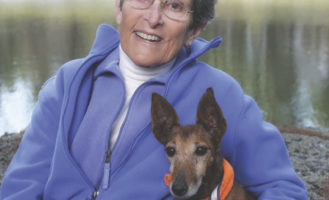
Not Your Zayde’s Shokl
The kinesthetics of feminist prayer
When my son was born, I cradled him against my heart, arms wrapped surely around his small body. I stood, swaying — our breaths mingled, our hearts beating in a call and response, one beat answering to the next—in a slow, side-to-side rock that felt like a sliver of eternity.
I could feel his body relax into the motion, like oceans, like drifting, like peace. I loved the simplicity of that rhythm, the warmth of him, the smell of his newness and his infinite possibilities. As he gentled, my own body followed.
When I found God again….
No. When I found the need to be part of a community in order to engage and have a conversation with God as part of that community, I began to pray more formally. I began, as it were, to davven. In earnest.
It started with Friday nights—joyous, raucous celebrations that ushered in Shabbat with drums and foot-stomping. Saturday mornings came later, when I learned how to be quietly joyful, to be still. If erev Shabbat was a communal romp in the fields of the Lord, shabbos mornings were a way to find individual sanctity in the midst of a holy community.
As I prayed, as I found my voice, something surfaced for me —a recognition both familiar and gentle. As a child, I had seen my grandfather davven often enough. In shul, he and his congregation would shokl—a quick, rhythmic motion back and forth, as if they were all about to walk forward but were rooted in place. The more impassioned their prayer, the faster, the more heedlessly, they rocked. Decades later, davvening, I found this unexpected connection to my grandfather: a shared choreography of holy time. Prayer moved me, not just spiritually, but physically, like it once moved him.
But there was a difference. Where my grandfather rocked forward and back, ready to be propelled outward or upward, to soar wherever it was that his prayer led him, my shokl was the gentle side-to-side that I’d found in my son’s infancy. It was not meant to propel me, but to flow, like oceans. Like time. One kind of shokling was not better than the other. Just different. Gendered.
Years have passed. My son is preparing to become a bar mitzvah. I drive him to his tutor’s, but I am not his teacher. Not for this. He has a community upon whom he can depend, who have so much to teach and share with him. So I was surprised, when I nagged him a little to practice the other day, that he asked if I would chant with him, pray with him.
I held my breath and nodded, hoping I appeared calm and nonchalant, while inwardly doing a little happy-dance-of-joy. I did not want to frighten him.
Mom, will you pray with me?
And he came and stood next to me as I sat at the table, my not-so-tall boy, my not-yet man. And he nestled his body next to mine and we prayed, and there came that gentle side-to-side rock, and our hearts beating in a call and response, one beat answering to the next—ancient, familiar, stately.
And we davvened, cradled, and I loved the warmth of him, the smell of his newness and his infinite possibilities, the slow, maternal shokl of eternity.





